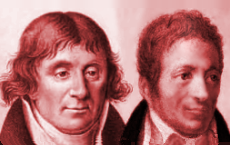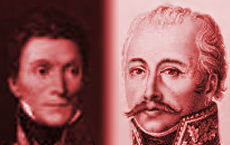In 1799, the Republicans in France were divided into five major political factions, each with its own nuances. These were:
- the Ideologues, followers of Nicolas de Condorcet;
- the Friends of Gilbert du Motier de La Fayette, admirers of George Washington and Thomas Jefferson, partisans of an American-style republic;
- Centrists, for whom the maintenance of order may well justified a few departures from principle;
- the Extremists, or Jacobins, who continued to believe in the ideals of Maximilien Robespierre;
- the egalitarian Babouvists, who escaped repression after the Conspiracy of Equals and have been living in hiding ever since.
Napoléon Bonaparte, for his part, enjoyed a reputation as a Jacobin general. His past spoke for itself. Appointed general at the suggestion of Augustin Robespierre, didn't he crush the royalist insurgents on 13 Vendémiaire, An IV? Didn't he send Pierre Augereau to assist the Directoire in carrying out the coup d'état of 18 fructidor an V against these same royalists, this time winners of the elections in all legality? But he was also close to the ideologues, whose leading names he frequented as a member of the Institut.
All republican factions, with the exception of the Babouvistes, were therefore initially sympathetic to his arrival in power.
The coup d'état of 18 Brumaire was organized or approved by most of the great names of the Revolution who were still active: Emmanuel-Joseph Siéyès instigated it, Jean-Jacques de Cambacérès, Joseph Fouché, already Minister of Police, facilitated it, as did Charles-Maurice de Talleyrand-Périgord. Most Jacobin generals participated, approved or let it happen.
But Bonaparte soon upset the convictions of some of his supporters. While he intended to establish a modern state incorporating the achievements of the Revolution, he also wanted to reunite the country. To achieve this, he had to take measures of reconciliation (amnesty for emigrants, concordat), which not everyone accepted.
At the same time, the regime's growing authoritarianism alienated ideologists, especially Benjamin Constant, theorist of political liberalism.
The struggle between Napoleon Bonaparte and his republican opponents quickly turned sour. With no real organization or leader, and susceptible to the siren calls of power, those who refused to accept the new regime soon accepted, for most of them, functions or prebends. So much so that Madame de Staël and Benjamin Constant, during the years of the Empire, almost single-handedly represented the declared republican opposition.


